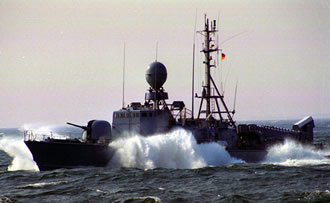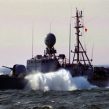
TURKEY SIDES WITH MOSCOW AGAINST WASHINGTON ON BLACK SEA FORCE
Publication: Eurasia Daily Monitor Volume: 3 Issue: 43
By:

Ankara and Moscow joined forces to reject the U.S. administration’s proposal to expand a NATO-led Mediterranean counterterrorism effort into the Black Sea. Turkey and Russia’s joint opposition to the U.S. request underscores the two countries’ growing wariness of U.S. strategic designs in the wider Black Sea region.
Turkey and Russia have long been reluctant to allow the extension of NATO’s naval Operation Active Endeavor from the Mediterranean into the Black Sea (see EDM, February 17, 2005). But now the rift between the long-time NATO allies, the United States and Turkey, has come into the open. “We would certainly be in favor” of the expansion, Kurt Volker, U.S. Deputy Assistant Secretary of State for European and Eurasian Affairs, said in Washington on February 24. But the senior diplomat conceded that the Black Sea littoral states had different views on this issue — “from more enthusiastic to less enthusiastic.”
Quite unsurprisingly, the “more enthusiastic” countries are new NATO members Romania and Bulgaria as well as the pro-Western Ukraine and Georgia. The countries that are not terribly happy to see the NATO vessels in the Black Sea are Russia – whose attitude is understandable — and Turkey — whose stance, undoubtedly annoys Washington. Indeed, Volker specifically pointed to Ankara’s position, saying that Washington is not going to “be pushing NATO in against the wishes of any NATO allies, particularly Turkey.” The State Department official’s comments appeared to be the first on-the-record remarks by the United States on the Black Sea Force issue, which means, some Turkish and international analysts suggest, that Washington had decided to go public about the rift.
Operation Active Endeavor (OAE) was created in late 2001 following the September 11 terrorist attacks against the United States. The force — a combination of naval units from the United States, Britain, Germany, Greece, Italy, the Netherlands, Spain, and Turkey — has the task to fight criminal and terrorist activity in the Mediterranean theater. Russia joined OAE at NATO’s invitation, but Moscow is categorically against OAE’s expansion into the Black Sea. Turkey appears to be viewing Russia’s position with understanding. “There’s not much point in engaging in efforts that unnecessarily would raise tensions in the Black Sea region,” one Turkish official was quoted as saying.
Turkey’s policymakers and analysts cite two main reasons behind the country’s opposition to the U.S. proposal. First, Ankara fears the erosion of the Montreux Convention, a 1936 accord that puts the Turkish Straits under Turkey’s control. Second, the Turks argue that OAE is simply redundant as the two already existing Black Sea naval force structures with NATO connections are sufficient to do the job. “The Black Sea littoral states have the capacity to carry out the mission through Black Sea Harmony and BlackSeaFor,” one Turkish official suggested. “We’re a NATO member, and we see no need for greater NATO involvement in the Black Sea.”
(Turkey launched Black Sea Harmony in 2004 to patrol the southern segment of the Black Sea. Recently, Ankara extended an invitation to other littoral countries to join its security initiative. The Black Sea Naval Task Force, or BlackSeaFor, was set up in 2001; the group comprises all six riparian states.)
It would seem, however, that the real reason behind Turkey and Russia’s opposition to Washington’s move is that the two countries likely perceive U.S. policies in the Black Sea and Caucasus region as being potentially destabilizing to their vital interests. Symptomatically, in 2005, when Russia blocked a U.S. request to get observer status in the Istanbul-based Black Sea Economic Cooperation organization (BSEC), Turkey, the group’s formal host and supposedly Washington’s “strategic ally,” did not raise a finger to help obtain a positive decision. It took the lobbying of other BSEC members to push the U.S. candidacy through.
Both Ankara and Moscow are extremely keen to preserve the status quo in the region and they perceive the West in general and Washington in particular as dangerous agents of change. The calls for the West’s more aggressive involvement in the region — such as, for example, a recent policy paper penned by high-profile U.S. analysts and titled “The Black Sea and the Frontiers of Freedom” — cannot fail to rattle Turkish and Russian strategists. While Turkey is particularly concerned about potential instability on its northeastern borders (similar to the crisis unfolding on its southeastern borders in the wake of the U.S. invasion of Iraq), Russia is primarily seeking to ward off Western penetration of its traditional sphere of influence.
Remarkably, the veiled U.S. criticism of Turkey’s stance came amid the growing military cooperation between Ankara and Moscow. On February 27, Russian-Turkish naval exercises kicked off in the Black Sea. The joint maneuvers appear to have crowned the visit to Turkey by Russian Navy Commander Admiral Vladimir Masorin.
(Turkish Daily News, March 1; Itar-Tass, February 27; Ifri.org [Russie.Nei.Visions no. 8, January 2006]; Policy Review, no. 125 [2004])




